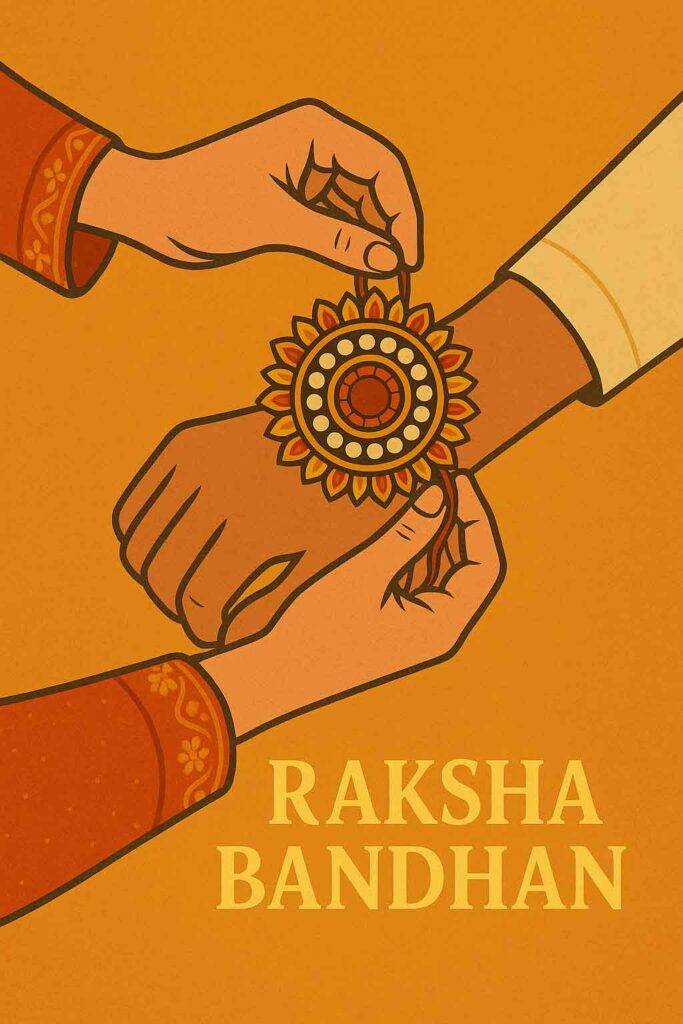Raksha Bandhan (July–August)
The Sacred Bond of Love and Protection

Raksha Bandhan, also known as Rakhi, is one of the most cherished festivals in India, symbolizing the pure and affectionate bond between brothers and sisters. The term “Raksha Bandhan” literally means “the bond of protection,” derived from the Sanskrit words Raksha (protection) and Bandhan (bond). Celebrated on the full moon day (Purnima) of the Hindu month of Shravan (July–August), this festival holds immense emotional and cultural significance. On this day, sisters tie a sacred thread called rakhi around their brothers’ wrists, praying for their health, happiness, and long life. In return, brothers promise to protect their sisters from harm and stand by them in times of need. This simple yet profound ritual celebrates not only familial love but also the timeless values of trust, care, and mutual respect.
The origins of Raksha Bandhan can be traced back to ancient Indian mythology and history. Several legends narrate how the festival came into being. One of the most popular stories is that of Lord Krishna and Draupadi. When Krishna injured his finger, Draupadi tore a piece of her saree and tied it around his wound to stop the bleeding. Deeply touched by her gesture, Krishna vowed to protect her always, a promise he fulfilled during the infamous disrobing scene in the Mahabharata. Another story tells of Queen Karnavati of Mewar, who sent a rakhi to Emperor Humayun, seeking his protection when her kingdom was threatened by Bahadur Shah. Honoring the bond, Humayun immediately came to her aid, showcasing that Raksha Bandhan transcends religion and caste, representing universal brotherhood and compassion.
The festival also finds mention in various Puranas and historical texts. According to another legend, when Lord Indra, the king of the gods, was losing a battle against demons, his wife Indrani tied a sacred thread around his wrist, empowering him with divine strength to emerge victorious. Over time, Raksha Bandhan evolved into a social and family festival, celebrating the affectionate ties between siblings and loved ones.
The celebration of Raksha Bandhan varies across regions but carries the same essence of love and protection. Preparations begin days in advance, with markets filled with colorful rakhis, sweets, and gifts. On the day of the festival, families gather for rituals. Sisters perform an aarti of their brothers, apply a tilak (vermilion mark) on their forehead, and tie the rakhi while chanting mantras that invoke divine blessings. The brother then offers gifts or money as a token of love and gratitude. Traditional sweets like ladoos, barfis, and kaju katli are shared, filling homes with joy and warmth. In modern times, the festival has also embraced digital forms—sisters send e-rakhis or courier rakhis to brothers living far away, ensuring that physical distance does not weaken emotional bonds.
Beyond the rituals, Raksha Bandhan carries a deeper social and cultural message. It reinforces the importance of familial relationships, love, and responsibility. In contemporary society, the festival’s meaning has broadened—people tie rakhis to friends, neighbors, and even soldiers as a gesture of solidarity and gratitude. Many women tie rakhis to the soldiers of the Indian Armed Forces, acknowledging their role as protectors of the nation. This extension of the festival reflects its universal message of peace, unity, and brotherhood.
Raksha Bandhan is also a reminder of India’s rich cultural heritage that celebrates human emotions and relationships. It promotes the idea of coexistence, equality, and care for one another. For children, it is a joyful day filled with laughter, sweets, and excitement, while for elders, it rekindles family ties and cherished memories. The sacred thread of rakhi thus becomes more than just a decorative band—it becomes a symbol of faith, commitment, and eternal love.
In essence, Raksha Bandhan stands as a celebration of human connection in its purest form. It teaches that protection and love are not bound by gender, religion, or distance but are universal values that unite all. As sisters tie the rakhi and brothers pledge to protect, the festival renews the spirit of care and mutual respect that strengthens families and communities. Every Raksha Bandhan reminds us that while threads may fade with time, the bond of love and protection they signify remains eternal, woven deep within the heart of every sibling relationship.
